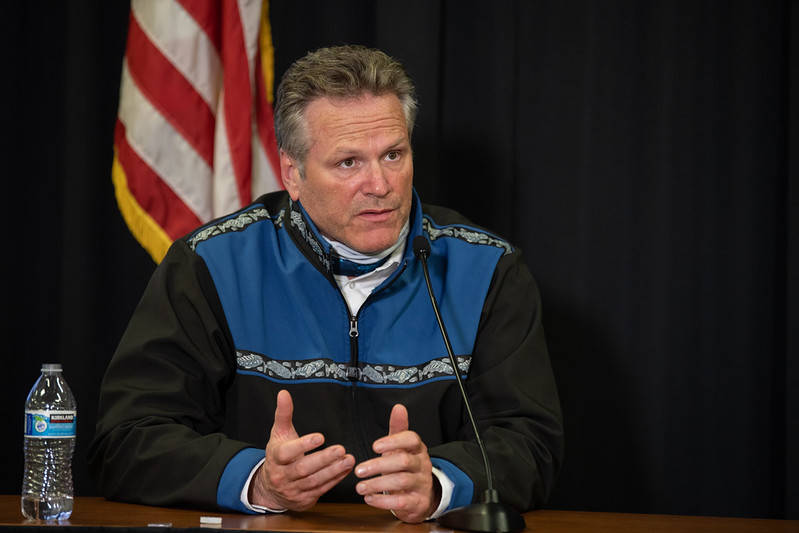By BECKY BOHRER
Associated Press
Gov. Mike Dunleavy said he views as valid his appointment of a revenue commissioner and picks for boards and commissions that the Legislature has not acted to confirm.
In letters dated Wednesday to House Speaker Bryce Edgmon and Senate President Cathy Giessel, Dunleavy said he was exercising authority under a provision of the state constitution dealing with recess appointments to continue their appointments.
His office, in a statement Thursday, said under the constitution, “it is incumbent upon the legislature to hold an up or down vote. Failure to do so is not a valid reason to reject the appointments, leaving critical positions in state government unfilled because lawmakers did not meet to fulfill their constitutional duty.”
[Governor’s chief of staff talks proposed bonds]
Edgmon and Giessel said Thursday morning they had not received the letters. Dunleavy spokesperson Jeff Turner said they were sent to the Senate secretary and House clerk for distribution.
Revenue Commissioner Lucinda Mahoney is among those not yet confirmed. Samantha Cherot, whose appointment as Alaska public defender was announced in September 2019, also awaits confirmation, as do many appointments to boards and commissions.
Dunleavy’s office said his appointees would be submitted at the start of the upcoming session and “will continue to serve until the lawmakers meet in joint session for the purpose of a confirmation vote.” The new Legislature will convene Jan. 19.
Edgmon, a Dillingham independent, called Dunleavy’s plans “another example of the governor acting in lieu of working with the Legislature.”
“I have concerns with the Legislature being bypassed time and again,” he said.
Typically, the House and Senate meet jointly to consider gubernatorial appointments near the end of a regular session in a process that can take hours.
But this year, amid COVID-19 concerns, lawmakers in March passed a law allowing them to adjourn and take up confirmations later. That law stated that a failure by lawmakers to act on the appointments would be tantamount to a declination of confirmation 30 days after an initial COVID-19-related disaster declaration expired or Jan. 18, whichever came first. The initial declaration ended Nov. 15.
The Legislature took an extended recess after passing a budget in late March and returned briefly in May before adjourning. It has not convened since. Edgmon and Giessel pressed Dunleavy to call a special session ahead of the Nov. 15 deadline, saying they lacked the votes for the Legislature to call itself into special session. He declined and has since issued two subsequent disaster declarations related to the pandemic, the most recent of which is set to expire in mid-January.
Some lawmakers chafed at Dunleavy’s unilateral issuance of a new disaster declaration to replace the one that expired Nov. 15 and questioned its legal underpinnings.
The Legislature’s top legal adviser, Megan Wallace, in a September memo to Sen. Bill Wielechowski, said if lawmakers did not meet in special session to extend the disaster declaration beyond Nov. 15, the appointees would be considered declined as of Dec. 16.
Wielechowski, an Anchorage Democrat, said these are unusual times, “and who knows how a court would rule on this.” He said he was sympathetic to the administration’s position but said maintaining checks and balances is important.
He also expressed concern with potential lawsuits if appointees made decisions someone sought to challenge.

